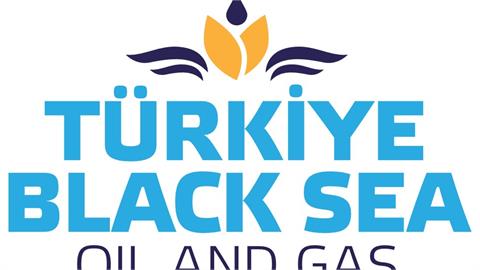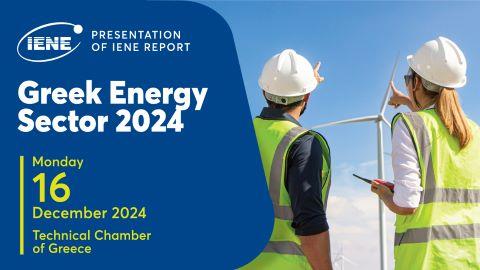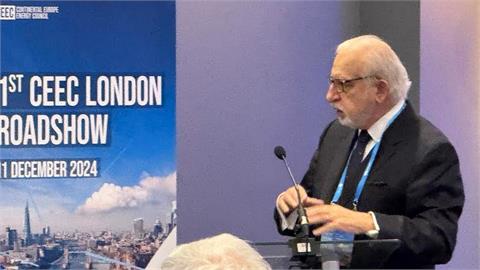More than 400 participants took part in the online one day conference which was organised by IENE on Tuesday, January 12 to examine latest developments and the outlook for building centred Energy Efficiency policies and projects. Although the conference focused on initiatives and programmes related to Greece it also covered global and European angles with the help of internationally recognised authorities.
EU's ambitious targets for 32,5% improvement in energy efficiency by 2030 for all 27 Member States has provided the impetus for the introduction of relevant country wide programmes at various levels of application.
In his opening remarks IENE's chairman Costis Stambolis stressed the importance of the building sector in achieving actual improvements in energy efficiency given the major role that the built environment plays in national energy demand in Greece, where 75% of the country's 4,3 million buildings stock corresponds to houses. " The scope is really enormous and EU- government backed energy efficiency measures could indeed mobilise a wide range of crafts and businesses and provide a much needed economic stimulus", observed Stambolis. " According to IENE estimates energy efficiency projects at housing and and public building level in Greece alone are likely to attract some € 12- €14 billion of investments by 2030", added IENE' s chairman.
Speaking in the same wavelength the chairman of IENE's Energy Efficiency Committee and conference coordinator Costas Theofylactos noted that Energy Efficiency is now regarded as a key pillar of EU's Green Deal which aims to Europe's Climate Neutral Economyby 2030. In this respect,noted Theofylactos, "energy efficiency plays a central role in achieving zero emissions by 2050 but is also a key factor in promoting cyclical economy. Besides large scale energy efficiency applications in the building sector contribute in lowering air pollution while helping promote ecosystem biodiversity and also enhance basic research and the drive towards innovative solutions"
In her introductory statement Mrs Alexandra Sdoukou, Secretary General for Energy & Mineral Resources of the Hellenic Ministry of Environment and Energy, underlined the great importance which "energy efficiency" has in the government's overall energy strategy which is geared in achieving EU targets for 2030. "Energy Efficiency is clearly a priority area for us" , said Sdoukou, and added : "We have already drawn plans for tapping €3 billion from Greece's share in the EU Recovery Fund and assign them to energy efficiency related projects to be implemented over the next 18-24 months. Furthermore, we see energy efficiency programmers as an opportunity to upgrade and modernize the country's aging building stock"
In her keynote address Jessica Glicker, project manager at the Building Performance Institute (BPIE) a non-profit organization based in Brussels, at the start of the 2ndSession presented an outline of major international and European developments but also explained BPIE's priorities in promoting and supporting instruments to increase the energy performance of buildings." Increasing buildings' energy performance is one of the most cost effective ways to reach the EU climate goals and to stimulate sustainable growth.It will lead to important social and environmental benefits and give a boost tomEurope's economy", Glicker said.
Jessica Glicker also explained BPIE's goals and work areas and underlined the support that her organisation provides to the European Commission in policy, regulatory and programme issues.
Other speakers included some of Greece's top experts and senior government officials involved in the planning and implementation of energy efficiency programmes. Mrs Joanna Nickou, head of Economic Assistance programmes at the Ministry of Environment and Energy, presented an overview of government backed energy efficiency programmes focusing on the latest "Saving Autonomous Programme" while Dr. Apostolos Efthimiadis, energy advisor to Hellenic Properties Federation (POMIDA) offered his insight on the practical problems and difficulties involved in implementing the above programme.
The third session of the conference, which was moderated by Savvas Louizides senior consultant and head of the energy unit at LDK engineering firm, focused on energy diagnostics and the technologies involved in energy efficiency applications.
Technology oriented presentations were made by representatives of companies and industries which between them covered the whole range of energy efficiency applications.
The fourth session covered public sector buildings and commercial/industrial properties and was moderated by Dr. Konstantinos Balaras, head of the Energy Efficiency Group at the Institute of Environmental Research and Sustainable Development of the National Observatory of Athens. Zero energy buildings and the financial aspects in the application of the latest government backed energy efficiency programme were discussed at length by energy engineers and banking executives.
Conference sponsors included "Elval Colour", a subsidiary company of the Viochalco group, the EsEnCon consulting company and the ENSCO group while Energia.gr acted as media partner.




